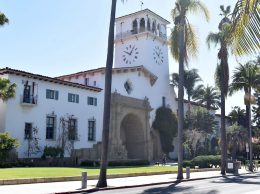USDA to offer settlements to farmers who faced lending bias
IN THIS ARTICLE
- Agribusiness Topic
- Dana Olsen Author
By Dana Olsen Friday, October 26th, 2012
In an effort to “correct the wrongs of the past,” the U.S. Department of Agriculture has instituted a retroactive claims process for Hispanic and female farmers and ranchers who allege there were denied loans from the agency for discriminatory reasons. Some of the potentially affected claimants are farmers in Ventura and Santa Barbara counties.
The department is holding informational meetings in 13 rural areas up and down the state over the next few months. It made stops in Santa Maria and the city of Ventura last week. Val Dolcini, executive director of the Farm Service Agency in California, led the Oct. 18 meeting in Santa Maria. He said the USDA is making $1.3 billion in federal funds available for cash awards and tax relief payments to eligible farmers.
Hispanic and women farmers who believe they were denied loans from the USDA for discriminatory reasons between 1981 and 2000 have until March 25, 2013 to file a claim.
“We really feel that the USDA effectively supports the rural way of life, which forms the backbone of our American values,” Dolcini said at the Santa Maria meeting. “The department is committed to resolving all cases of past discrimination and the department’s leadership has made civil rights a top priority … We’ve created this voluntary claims process to address discrimination claims that Hispanic and women farmers and ranchers have made. We believe this process will help resolve these claims more simply [than the alternative of individually filing lawsuits in federal court].”
Hispanic and female farmers across the U.S. have filed two separate class action lawsuits in federal court alleging that the USDA denied them loans or loan services for discriminatory reasons. However, those cases were denied certification as class actions because the court found that the plaintiffs didn’t meet the required legal threshold showing that there were questions of law or fact common to the class.
“The opening of this claims process is part of USDA’s ongoing efforts to correct the wrongs of the past and ensure fair treatment to all current and future customers,” U.S. Agriculture Secretary Tom Vilsack said in a Sept. 24 news release that announced the voluntary claims process.
The process is a non-judicial way for the farmers and ranchers who were either involved in the class-action lawsuits or fit certain criteria to request settlements from the federal government. In partnership with state agencies, the USDA is reaching out to Hispanic and female farmers and ranchers around the country.
To be eligible, Dolcini said, Hispanic and women farmers and ranchers must have farmed, or attempted to farm, between 1981 and 2000. They also must meet one of the following criteria: Their loans must have either been denied during application or review, provided late, approved for a lesser amount, approved with restrictive conditions or not appropriately serviced, or the claimant must have been discouraged by the USDA from applying for a loan at all.
“If you meet one of those criteria, this is probably a process you should learn more about,” Dolcini said, adding that the USDA can’t provide legal advice, but it can provide details about how to become a claimant. Farmers and ranchers who file successful claims will be awarded up to $50,000 cash, in addition to possible tax relief.
The Hispanic and female claims process is the latest in a series of attempts by the Obama administration to resolve large civil rights cases involving the USDA. In 2010, President Obama and the USDA announced a settlement with black farmers that provided $1.2 billion to address pending claims of discriminatory loan practices. That case is called Pigford II because it arose from Pigford v. Glickman, a 1999 lawsuit against the USDA that alleged racial discrimination in its allocation of farm loans.
A year later, the department announced $760 million in funds for Native American farmers and ranchers who believed they were entitled to relief under the Keepseagle settlement, which started as a lawsuit alleging that the way the USDA’s loan program operated racially discriminated against Native Americans.
Dolcini said the mission of the state’s farm service agency is to equitably serve all farmers, ranchers and agricultural partners with programs, including loans, that support agriculture. Essentially, the department takes what Congress says in its farm bill and translates it into statewide programs.
In the Tri-Counties, the agency has an office in Santa Maria that serves Santa Barbara and Ventura counties and another office in San Luis Obispo.










